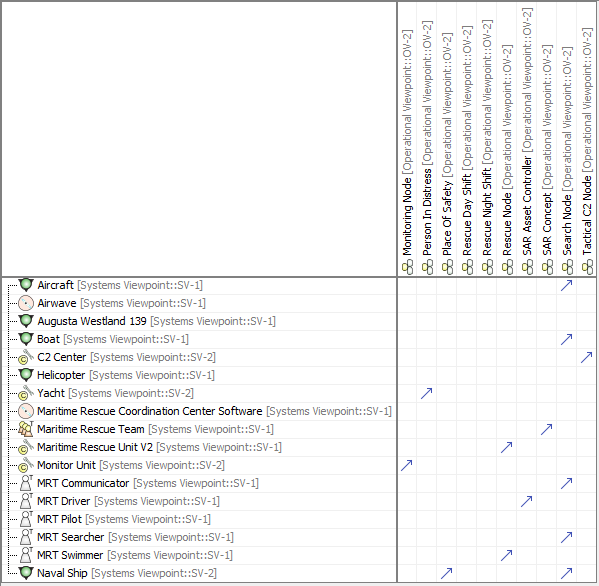Description
The Implementation Matrix describes the mapping between the Resources Elements and Operational Elements directly or using the implied relations.
The DoDAF, MODAF, NAF, and UAF Operational viewpoint elements should be implemented by the Systems / Resources or Services viewpoint elements. The implementation in UAF is defined by the Implements relationship. It connects the implementation and specification elements. In order to specify the implementation and analyze implementation gaps, the Implementation Matrix is added as a supportive product for UAF.
Implementation
An Implementation Matrix can be represented by a Dependency Matrix-based diagram. The implementation elements will be used as the row elements and specification (implemented) elements will be used as the column elements.
The Rows of the matrix are:
- Resources Elements (Resources, Functions, Resource Interfaces, Data Elements, Resource Roles, Resource Connectors, and Resource Exchanges).
- Operational Elements (Operational Activities).
The Columns of this matrix are:
- Operational Elements (Operational Agents, Operational Activities, Operational Interfaces, Information Elements, Operational Roles, Operational Connectors, and Operational Exchanges).
- Services Elements (Service Functions and Service Interfaces).
- Strategic Elements (Actual Enduring Tasks).
Sample
Predefined configurations
There are several types of predefined implementation matrices:
- Operational Performers Implementation Matrix. It maps Operational Performers to System Resources only.
- Operational Activities Implementation Matrix. It maps Operational Activities to Functions.
- Operational Exchanges Implementation Matrix. It maps Operational Exchanges to Resource Exchanges.
You can find predefined matrices by clicking Analyze > OV-SV Gap analysis.
These matrices provide analysis of the whole model of a particular implementation, so you do not have to define the scope or any additional properties for building them.
